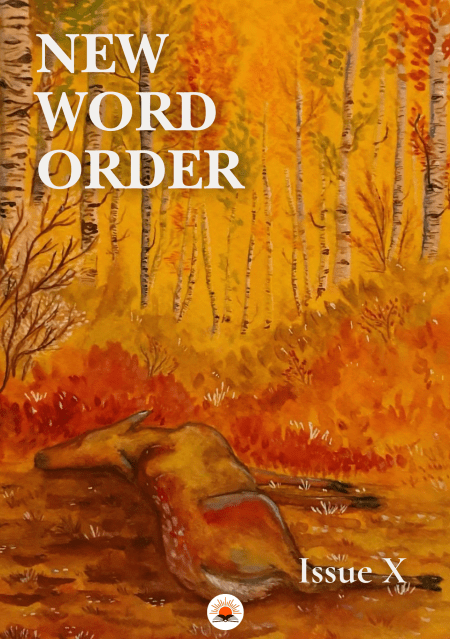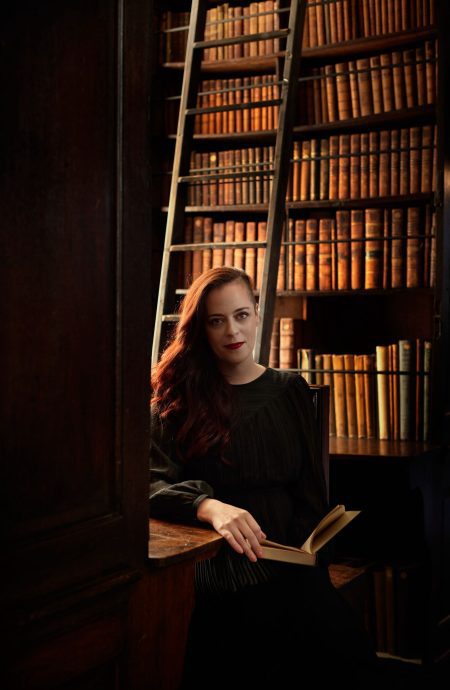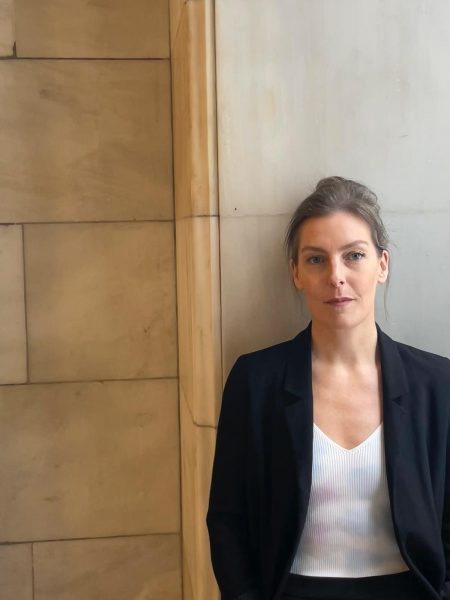by Mary Irving, she/her
Da used to tell this joke.
“If you go to a party,” he’d start, shifting in his seat and taking another sup of his pint. “If you go to a party and don’t spot the feckin’ eejit in the first ten minutes….”
He’d stop to make sure everyone was listening.
“If you don’t spot the feckin’ eejit in the first ten minutes一well, it’s probably yourself!” He’d sit back then, chuckling with laughter, enjoying the mirth that bubbled around him.
He meant no harm. It was only a joke. But you remembered him telling that yarn time and time again over the years. Every time, in fact, you walked into a crowded room.
And you get it, because you’ve got to see things from other people’s point of view. Here comes this bloke, unsteady on his feet, bumping into things一knocking over a glass two minutes after walking in the door or stepping on some woman’s high heeled foot, making her wince with pain. Their first thought? He’s drunk. They don’t give you a chance to explain before they edge away, throwing you a half smile一if you’re lucky. If you’re unlucky, some protective he-man growls: “Hey! Watch it!” and you want to give some smart ass reply, but you size him up and decide against it, knowing that one shove from him would send you toppling.
It happened before. All you’d said was: “Ah, give it a rest!” You never even saw the fist, only felt it like a hammer to your chest before you staggered backwards and fell on to a low table, sending drinks flying, women jumping up and screaming. Some ol’ lad dragged you to your feet, some woman scrambled around on the floor to retrieve your glasses and somewhere in the middle of all the brouhaha, they caught on and they were all sympathy. The ol’ lad even went up to the fella who pushed you and told him to come over and apologise. Your man refused, of course, and the two of them ended up in a screaming match at the bar. You sidled off while they were still at it and you did have a laugh about it on the way home, the thought of the two of them fighting over you. Then you stopped laughing. Thought about how you’d like to have landed a punch on that fella’s soft face, how much you’d like to have heard the crack-crunch of bone as you broke his perfect nose. It would have been sweet to see the shock in his eyes.
But the thing is, at least your man thought you were normal. He reacted like he would if any other twenty-something-year-old stepped on his pretty girlfriend’s precious toes. And there is something kind of wholesome in that. Even if you have the bruises to prove it.
The pitiers are worse. They take one look and make a bee-line for you. In fairness, you know what they see because you have to look at it each and every morning. And each and every morning, you want to put your fist through the mirror to shatter what is reflected there. What they see is the limp, the awkward gait. They see the rigid left arm, cocked out elbow high. They see stiff fingers, doubled back on themselves. They see all this in one glance. So, they clamber onto their white horses and ride in at a gallop to rescue poor, unfortunate you.
“Hi, I’m Anne”一or Daisy, or Margaret. Yes, they’re usually women, they’re usually middle aged and they’re usually gazing at you, eyes swimming with compassion.
“What’s your name?” they say, enunciating each word slowly and carefully in those loud voices usually reserved for decrepit aul ones in nursing homes.
“Eoin,” you reply, because you don’t want to be rude. Though you know this is a mistake. Because now you’re giving the impression that you only speak in monosyllables.
“Eoin,” they say. “What a lovely name.”
I was telling my friend, Declan, about these encounters while he roared laughing.
“I think I was six years old when someone last said that to me,” he said.
Let’s face it, the pitiers have their advantages. They can’t do enough for you. They’ll help you remove your jacket, insist on getting you a seat. They’ll even buy you a drink. But conversation? Forget about that.
“You went to college?” they say, nonplussed. Because, yes, you’ve blurted it out一you can’t help yourself. You know it’s pathetic, this need to prove yourself, this urge to get total strangers to see beyond your palsied arm, your wasted leg.
“Well, good for you,” they say. You hear it like a put down. So you make the next mistake and tell them about your job. Even to your own ears, you sound boastful, full of yourself, over the top. You see the sympathy waning in their eyes. You see how they feel lumbered with you now. It’s easy then, to turn them right off. Rant about the homeless, throw in a few curse words一and they’re gone in a flash. See, if you have a disability, you‘re not supposed to launch into a diatribe about something that bothers you, you’re not supposed to use profane language. You’re already enough of a burden on society.
Then, there are the ones that treat you like a non-person. It’s not like they don’t see you一 they do. All too clearly. They just don’t want to be associated with you. They’re the strangers on the bus who move to another seat when you sit beside them. They’re the fellas you went to school with, who cross the street now to avoid being seen with you. The very fellas that would scrounge your last euro out of you when you were at school.
“Ah, come on, Eoin, we know you have it.”
“Yeah, we all know you get that Disability Allowance every week.”
“For God’s sake, Eoin, we’re only asking you for a few euro. The price of a sandwich.” Or a bag of crisps, a packet of fags, a couple of cans. Calling you Scrooge until you hand it over. Then you wouldn’t see them for dust. Even if you tried to follow them, tried to hang on to their coat tails, you couldn’t keep up. They’d see you trailing behind them and quicken their pace to be rid of you.
You thought it would be easier in college. And it was in ways. People weren’t so obvious, that’s for sure. You made friends there一friends for life. Declan laughed at all your jokes, laughed so hard that others couldn’t help joining in. The two of you sat together most days and by the end of first year, Dave had joined you. The three of you got a name for being funny, ironic一clever even. People smiled at you. People knew your name. You got invited to parties. There was only one problem. Girls.
To put it mildly, you liked girls. You liked the look of them, the curves. You liked the way they moved, the way they smelled. You liked the softness of their hands, the sound of their laughter一to be honest, you could go on all day about girls. You liked girls, in a ‘full blooded Irish male way’, as Declan liked to say.
And girls liked you. Or seemed to. They had no problem coming up to chat, stopping in corridors to ask how you were getting on, even opening doors for you, for God’s sake. But ask them out on a date? They ran a mile. Some tried to let you down easy.
“I’m just coming out of a relationship.”
“I’m just going into a relationship.”
“I’m kind of between relationships.”
Others just paled.
“What? Me and you?” Like you had somehow offended their honour. Like you had no right to ask. Like一hadn’t they been good enough to you already without you putting them in this embarrassing position? They’d cool off then, avoid you around the place, block you on Facebook, delete your number from their phones. As if you’d humiliate yourself by ever asking them out again. You couldn’t bear the sight of them.
Catherine plonked down beside you one night as a party was drawing to a close一a couple dancing drowsily in the centre of the room, raucous laughter coming from the kitchen. She was eating a packet of crisps.
“Want one?” She held the packet towards you.
You didn’t.
“What’s with the arm and the leg?” she said, through a mouthful of crisps.
“Cerebral palsy,” you answered wearily, waiting for the inevitable一the volley of queries about the when and the how and the poor you.
“Oh, right.” She ate another crisp. “What sort of music are you into?”
Before you knew it, you were in a conversation about Coldplay and Taylor Swift. And she was mad into Inside Out but you preferred Birdman and she didn’t like the rain but you hated the cold. About half way in, you looked at her, sitting there, shaking the last of her crisps into her hand and you realised how very pretty she was, the way her hair fell over one eye and freckles danced about her nose. Then she asked if you’d like to go to a movie sometime.
A year in and Declan still worries that you’re punching above your weight. A year in and you still get satisfaction out of meeting the lads from school on Grafton Street when you’re holding her hand. You see them melt under her smile and you see them think: What the hell is she doing with him? A year in and you rarely go to parties but when you do, you go together. She laughs when you knock over drinks and her laugh is light, like it doesn’t matter. Like there doesn’t have to be a feckin’ eejit at every party. And if there is, it doesn’t have to be you.


